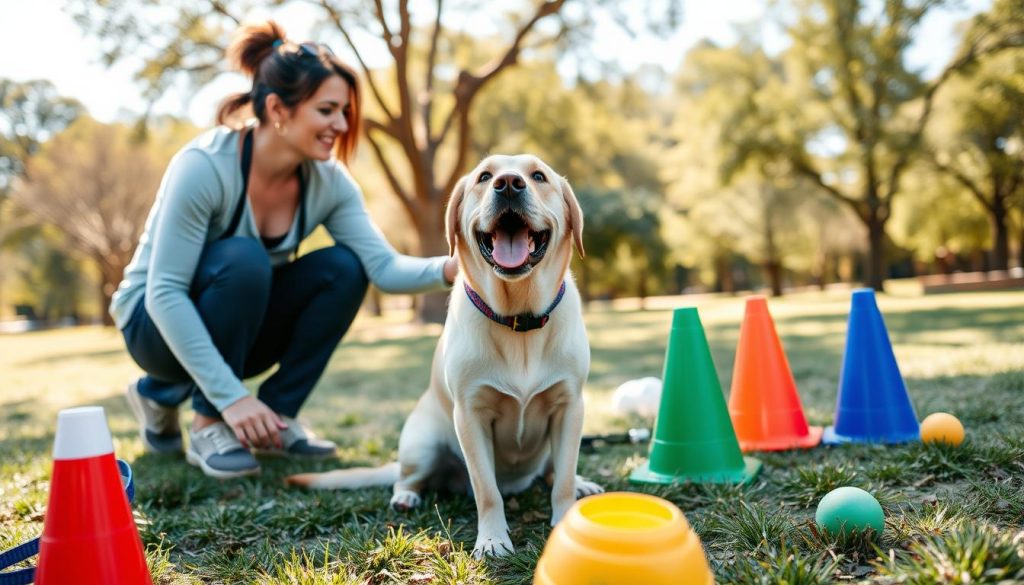Labrador Retriever Barking: How Much Is Normal?
Did you know Labrador Retrievers are moderate barkers compared to other breeds1? They bark to communicate, like alerting owners or showing excitement1. But, too much barking can be a worry. Knowing what’s normal helps keep your home peaceful.
Key Takeaways
- Labrador Retrievers are generally not known for being excessive barkers, but their barking tendencies can vary based on individual temperament, socialization, and training2.
- Labradors typically bark to communicate, such as alerting their owners, responding to unfamiliar situations, or expressing excitement1.
- Consistent training and positive reinforcement can be effective in managing any excessive barking in Labrador Retrievers1.
- Environmental changes and health issues can also impact a Labrador’s barking habits1.
- Proper socialization from a young age is crucial in shaping a Labrador’s barking behaviour2.
Introduction to Labrador Retriever Barking
Labrador Retrievers are known for being friendly, loyal, and smart. But, their barking habits are a big interest for both new and current owners3.
Labrador Retrievers: A Generally Quiet Breed
Labrador Retrievers are not known for barking a lot. They were bred to be quiet, as fishing dogs needed to sneak up on fish3. Today, they are calm and rarely bark.
Barking as a Means of Communication
Labradors may not bark a lot, but they do bark to show feelings, warn of dangers, and protect their space4. Their barking is a key part of how they communicate, but it should not be too much.
Labrador Retrievers are mostly quiet, but they do bark to communicate34. Knowing how they bark helps owners understand when it’s normal or when it’s too much.
Do Labrador Retrievers Bark a Lot?
Labrador Retrievers are not known for barking a lot. Their ancestors were bred for their quiet nature. Excessive barking was never wanted in the breed5. They were fishing and hunting dogs, where barking was not needed5.
Labradors do bark to talk to their owners and other dogs. But, this barking should not be constant or too much5. They bark to show feelings, warn of danger, protect their area, and chat with other dogs5.
But, Labradors can start barking too much for many reasons. This includes bad training, their genes, and their environment5. They might bark because they’re bored, scared, miss their owners, or are sick5.
Labrador Retrievers are not usually loud barkers. But, many things can make them bark more. Knowing why they bark and acting on it can keep their barking normal5.
Common Reasons for Labrador Barking
Labrador Retrievers are known to bark moderately. However, some dogs may bark more due to their personality6. Things like how well they get along with others, their energy, and how well they listen to training can affect their barking6.
Boredom and Lack of Exercise
Boredom can make Labradors bark more as they look for something to do6. Without enough to keep them busy, they can get frustrated and bark a lot6.
Fear, Stress, and Anxiety
Labradors may bark due to anxiety, showing signs like nervousness, whining, and avoiding things6. Being in a new place can make them feel scared and bark for attention6.
Attention-Seeking Behaviour
Labradors often bark to get attention7. Playing with them when they bark can make them bark more, changing how they communicate6.
Labradors bark for many reasons, like playing, being scared, or needing attention6. Their body language can tell us what they’re trying to say6. They might bark because they’re frustrated, bored, or trying to protect something6.
| Reason for Barking | Potential Triggers |
|---|---|
| Boredom and Lack of Exercise | Insufficient physical and mental stimulation |
| Fear, Stress, and Anxiety | New environments, separation, perceived threats |
| Attention-Seeking Behaviour | Lack of attention, restricted playtime, inability to access desired objects |
To reduce your Lab’s barking, find out why they’re barking7. Training can help a lot, and there are ways to teach them to be quieter7.
Age and Health-Related Factors
As Labrador Retrievers get older, they might bark more. This is because of health issues that come with age8. For example, older dogs may lose their hearing or vision. They bark more to make up for this loss8.
Health problems like arthritis and hip dysplasia can also cause pain. This pain makes them bark more8.
Some health issues, like laryngeal paralysis and hypothyroidism, can change how they bark8. Laryngeal paralysis makes a ‘honking’ sound. Hypothyroidism can make them gain weight and feel tired, leading to less barking8.
Watching for sudden barking is important. It could mean there’s a health problem9. Taking your dog to the vet is a good idea to check for health issues9.

Obesity is another big problem for Labradors. It can make joint and breathing problems worse, leading to more barking8. Keeping them active, eating well, and staying slim is key for their health8.
Knowing how age and health affect barking in Labradors helps owners. They can notice changes and get vet help when needed.
Managing Excessive Barking in Labradors
Dealing with too much barking in Labradors needs a few steps. Giving them enough physical and mental activities is key to stop this behaviour1011. Make sure your Labrador has at least two walks a day, lots of playtime, and fun toys. This helps prevent boredom and frustration, which can lead to barking.
Providing Sufficient Exercise and Mental Stimulation
Labradors are full of energy and bark when they’re not using it11. Activities like fetch, swimming, or hiking can wear them out and cut down barking. Also, keep their minds busy with training, puzzle toys, and hidden treats1011.
Ignoring Attention-Seeking Barking
Labradors bark to get attention, and it gets worse if owners give in10. Ignore the barking and praise them when they’re quiet. This teaches them that barking doesn’t get you attention11.
Addressing Separation Anxiety
Separation anxiety often causes Labradors to bark a lot12. They may bark, howl, or whine when left alone, feeling distressed1012. Give them safe chew toys, calming music, and maybe medication (with a vet’s help) to ease their anxiety and barking10.
By tackling the reasons for too much barking, like boredom, anxiety, and wanting attention, you can manage this problem in Labradors1211. Getting help from a dog behaviourist or trainer can also be very helpful. They can create a plan to stop your Labrador’s barking12.
Socialization and Training Techniques
Getting your Labrador Retriever socialised and trained is key to managing their barking. Labradors that are well-socialised bark less at strangers and animals13. It’s important to expose them to different people, places, and experiences early on. Make sure these experiences are positive, rewarding them with treats and praise13.
Teaching your Labrador to respond to “speak” and “quiet” commands can help control their barking14. Labradors are smart and learn quickly, making them great for training14. Be consistent and patient when teaching these commands to manage their barking.
- Introduce your Labrador Retriever to a variety of people, animals, and environments during the critical socialization period between 5 and 12 weeks of age13.
- Gradually expose your Lab to new sights and sounds, rewarding calm, positive responses13.
- Teach your Labrador Retriever the “speak” and “quiet” commands to control their barking14.
- Enrol your Lab in training classes to reinforce basic commands and improve their socialization skills14.
Remember, socialisation and training are ongoing for Labrador Retrievers13. Older dogs may lose their social skills, leading to anxiety or reactive behaviour13. Refreshing their training with patience and consistency can help keep them confident and reduce barking.

By combining effective socialisation and targeted training, you can help your Labrador Retriever become a well-adjusted, confident, and well-behaved companion1314.
Seeking Professional Help
If you’ve tried the above methods and are still struggling with your Labrador Retriever’s excessive barking, it may be worth seeking professional help from a dog trainer or veterinarian. They can offer tailored advice and training methods to help you and your dog communicate better and reduce barking15.
A dog trainer can find the root cause of the barking and create a special training plan. They might use positive reinforcement, like rewarding your dog for being quiet, to change the behaviour16.
Meanwhile, a veterinarian can check for any medical issues that might be causing the barking, like anxiety or pain. They can also give medication if needed to calm your dog and reduce barking16.
Remember, patience and consistency are key when working with a professional. Fixing your Labrador Retriever’s barking might take time and effort. But with the right support, you can find ways to lessen the barking and improve your dog’s happiness1516.,
“Seeking professional help is often the key to resolving persistent dog barking issues. A qualified trainer or veterinarian can provide the expertise and guidance needed to effectively address the problem.”
Conclusion
Labradors are not naturally big barkers. But, any dog can bark too much if they’re stressed, bored, or in pain6. The amount of barking by Labs depends on their temperament and personality. Things like socialization skills, energy levels, and eagerness for training also play a part6.
Labradors, as a breed, are not known for being excessive barkers5. But, some common reasons for excessive barking include boredom, fear or stress, separation anxiety, and aging or illness5. If your Lab’s barking is a problem, try different management techniques. These include providing enough exercise and mental stimulation, ignoring attention-seeking barking, and addressing separation anxiety5.
It may take time and patience, but you can reduce your Labrador’s excessive barking. With the right approach, they can become the loyal, loving companions they’re known to be. By understanding why they bark and using effective training and management strategies, you can keep their barking within the normal range65.
FAQ
Do Labrador Retrievers bark a lot?
Labrador Retrievers are not known for barking a lot. They were bred for their quiet nature. However, they will still bark to communicate with their owners and other dogs.
What are the common reasons for excessive barking in Labradors?
Labradors bark a lot due to boredom, fear, or stress, and to seek attention. They are high-energy dogs and need lots of physical and mental stimulation. Scared or anxious dogs may bark to ward off threats. They can also bark due to separation anxiety when left alone.
How can age and health affect a Labrador’s barking?
Older Labradors may bark more due to age-related issues. Dogs with mobility problems may bark out of frustration or pain. If your Lab’s barking increases suddenly, take them to the vet to check for health problems.
How can I manage excessive barking in my Labrador?
To manage excessive barking, provide enough physical and mental stimulation. Ignore attention-seeking barking, as Labs crave attention. Addressing separation anxiety is also key to reduce barking and howling when you’re away.
How can socialisation and training help with a Labrador’s barking?
Socialised dogs bark less at strangers and animals. Get your Lab used to different people and experiences early on. Reward them with treats and praise. Teaching “speak” and “quiet” commands can also help manage barking.
When should I seek professional help for my Labrador’s excessive barking?
If you’ve tried various management techniques and still face excessive barking, seek professional help. A dog trainer or vet can offer tailored advice and training to improve communication and reduce barking.
Source Links
- How Much Does a Lab Bark? – https://iheartdogs.com/how-much-does-a-lab-bark/
- Do Labradors bark a lot? – https://www.hotdogsgrooming.co.za/do-labradors-bark-a-lot/
- Labrador Retriever Dog Breed Information & Characteristics – https://dogtime.com/dog-breeds/labrador-retriever
- Labrador – https://www.barkbusters.co.uk/dog-breed/labrador
- Do Labradors Bark a Lot? How Much & How to Stop It – Dogster – https://www.dogster.com/dog-breeds/do-labradors-bark-a-lot
- Why Does My Lab Bark So Much? | Snowy Pines – https://www.snowypineswhitelabs.com/blog/why-does-my-lab-bark-so-much/
- Labrador Barking Help And Information – The Labrador Site – https://www.thelabradorsite.com/labrador-barking/
- Common Health Problems in Labradors – https://www.purina.co.uk/articles/dogs/health/symptoms/labrador-health-problems
- What causes dogs to bark excessively? – RSPCA Knowledgebase – https://kb.rspca.org.au/knowledge-base/what-causes-dogs-to-bark-excessively/
- How to stop your dog barking | Dogs Trust – https://www.dogstrust.org.uk/dog-advice/training/unwanted-behaviours/stop-your-dog-barking
- How to stop your dog barking – https://www.battersea.org.uk/pet-advice/dog-advice/how-stop-your-dog-barking
- How To Stop Your Dog Barking Too Much | RSPCA – RSPCA – rspca.org.uk – https://www.rspca.org.uk/adviceandwelfare/pets/dogs/behaviour/barking
- How to refresh your dog’s socialisation training – https://www.petplan.co.uk/pet-information/dog/advice/dog-socialisation/
- Labrador Dog Behavior: What Every Owner Should Know – https://medium.com/@HappyPawsTraining/labrador-dog-behavior-what-every-owner-should-know-4a921eeb661c
- No title found – https://www.akc.org/expert-advice/training/neighbors-dog-barks-constantly/
- Untrusting Lab – https://www.labradorforums.co.uk/threads/untrusting-lab.4058/

